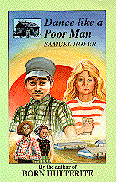


|
Dance Like a Poor Man.
Samuel Hofer.
Grades 6 - 10 / Ages 11 - 15. *** /4
|

excerpt:
On lotday Sunday the sun climbed over the heavens hidden behind high, feathery clouds, and I stood outside our unit for a while in the afternoon, playing tricks on my eyes. I stared and squeezed, watching the blood hues rush together and become ghosts of the sun inside my head. Each time I let the light flood back in, I saw I was still at Rockyview Colony, and the blue Canadian Rockies rising up out of the foothills winked back at me. I listened for the wind. On lotdays, my father had said, the wind blew where it wished, and you heard the sound, but you didn't know where it would blow you till the preachers made the draw. I heard a calf bawling over at the corral. but that was all. There was just a wisp of a breeze on lotday, and you couldn't hear that.
 In addition to providing an enticing family/coming of age story
with a touch of a mystery, Hofer offers middle school readers an
informing glimpse into the daily routines of the communal lifestyle
of one of Canada's little known peoples, the Hutterites. Over two
summer weeks, 12-year-old Peter Waldner experiences many changes in
his life. Because his Rockeyview Colony in Alberta has exceeded
its optimum population, its membership must be divided, and half of
its residents will go to live on the new colony of Flat Willow in
Saskatchewan.
In addition to providing an enticing family/coming of age story
with a touch of a mystery, Hofer offers middle school readers an
informing glimpse into the daily routines of the communal lifestyle
of one of Canada's little known peoples, the Hutterites. Over two
summer weeks, 12-year-old Peter Waldner experiences many changes in
his life. Because his Rockeyview Colony in Alberta has exceeded
its optimum population, its membership must be divided, and half of
its residents will go to live on the new colony of Flat Willow in
Saskatchewan.
On "lotday," Peter's family is one of those chosen, and Peter must reluctantly abandon his dream of becoming a "cowboy" on the cattle based Alberta colony for the less romantic role of being a gooseboy at the poultry/pig focused Flat Willow. Wandering about the countryside surrounding his new colony, Peter stumbles upon a deserted shack where he meets an "English" girl, Tessa Longman, who is about his age. Though Peter knows that his father would disapprove of his fraternizing with "people of the world," he finds himself attracted to both Tessa and the unknown way of life she represents. Tessa also becomes the key to unravelling the mystery of a missing rifle and the discovery of a man's frozen body, events which occurred during the period when the new colony was being constructed.
While the title's meaning may seem obscure to potential readers, "poor" is being used in the sense of "mad" or "insane," and the title captures the climactic moment when Peter's father catches him violating Hutterite values by dancing with Tessa. Whether Peter, as he matures, will remain true to his people's traditions is left for readers to decide.
A concluding "About the author" note establishes Hofer's credentials for writing about Hutterites. Numerous Hutterite terms are incorporated into the story, and, while the meanings of most can eventually be deduced from context, a glossary would nevertheless have been useful. Because the juvenile characters on the cover look quite young, teachers and librarians may need to introduce this book to its intended audience.
Recommended.
Dave Jenkinson teaches courses in children's and adolescent literature at the Faculty of Education, University of Manitoba.

To comment on this title or this review, send mail to cm@umanitoba.ca.
Copyright © 1997 the Manitoba Library Association. Reproduction for personal use is permitted only if this copyright notice is maintained. Any other reproduction is prohibited without permission.
Published by
The Manitoba Library Association
ISSN 1201-9364
TABLE OF CONTENTS FOR THIS ISSUE - APRIL 11, 1997.
AUTHORS | TITLES | MEDIA REVIEWS | BOOKSHELF | BACK ISSUES | SEARCH | HOME